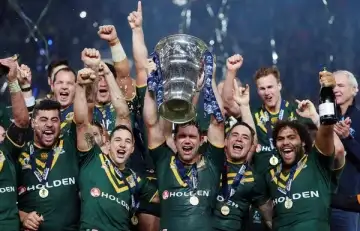World Cup Review – who is holding back the legacy?

It was hard not to come out of the World Cup’s official tournament review full of positivity.
A recorded profit of £3.7m was the headline of an array of success stories, ranging from ticket sales to community engagement, fans experience their first ever live rugby league game to attracting fans from the key ABC1 demographic.
It’s a shame for Nigel Wood and his team that we are still waiting for England’s next game to be announced – although news of the upcoming Four Nations are set to finally be revealed this week.
The legacy that rugby league is so desperate to create and build upon is in threat of falling out of the game’s grasp.
While the RFL appear keen to pursue an international calendar, and the anticipated commercial and potential growth in exposure it brings, they continue to be given the cold shoulder by Australia, no doubt happy with their increasingly successful NRL brand.
If the biggest and most successful rugby league nation in the world isn’t interested in the international game, what hope of getting anyone else to buy in?
Of course, the RFL could focus on the European game – although even the European Championship games are yet to be announced, when in reality, they should have been confirmed and tickets sold during the World Cup, when interest in international rugby league was at its highest.
The review revealed an array of positives – a direct economic impact of £9.6m for England and Wales, a UK TV audience of 13.3m, a 76% spectactor occupancy at matches and a total of 65% ticket purchasers from the much sought after ABC1 socio-economic range.
Yet still, four months later, the only international games currently on the calendar for 2014 involve countries such as Malta, Ukraine and Russia.
The Four Nations, involving Australia, New Zealand, England and Fiji, is set to take in games at Brisbane, Dunedin and a final at Wellington, but still fans aren’t aware of the finalised dates and locations to buy tickets and book their trips.
Compare that to football, where England know their games for the next two years, despite the fact there’s a World Cup around the corner; and in rugby union, where again, the calendar is worked out long in advance.
It’s time an independent body was created to drive the international game. The RFL can’t do everything – they’re currently trying to govern Super League, the Championships, the grassroots game and the international game, spreading themselves too thinly to do an effective job. A delegation of duty is required, and none more so than with international development.
The RLIF, effectively a non-entity at present, now has £3.7m in its coffers to invest in a true legacy.
If that means Australia and NRL chiefs relinquishing control somewhere along the line, then so be it.
But the RFL and England know that without Australia and New Zealand, they’re going to struggle for regular tests on the international stage.
So, international rugby league is heading for an impasse.
It needs fixing quick, before all the hard work of last autumn becomes undone.